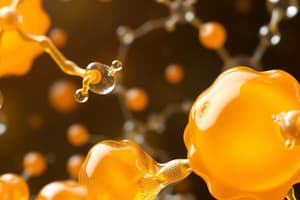Podcast
Questions and Answers
What are lipids known for?
What are lipids known for?
- Mixing well with water
- Being hydrophobic (correct)
- Circulating as chemical signals (correct)
- All of the above
Hydrophobic means fear of water.
Hydrophobic means fear of water.
True (A)
What is the best-known steroid?
What is the best-known steroid?
Cholesterol
What are the main steroid hormones?
What are the main steroid hormones?
What are saturated fats?
What are saturated fats?
What are trans fats?
What are trans fats?
What are fats primarily used for?
What are fats primarily used for?
Polyunsaturated fats have only one double bond.
Polyunsaturated fats have only one double bond.
Why are steroids classified as lipids?
Why are steroids classified as lipids?
Small changes in steroid structure can lead to large changes in the body.
Small changes in steroid structure can lead to large changes in the body.
Flashcards
Lipid property
Lipid property
Lipids are hydrophobic, meaning they repel water.
Cholesterol type
Cholesterol type
Cholesterol is the best-known steroid.
Steroid hormones
Steroid hormones
Testosterone and estrogen are key steroid hormones.
Saturated fat structure
Saturated fat structure
Signup and view all the flashcards
Trans fat behavior
Trans fat behavior
Signup and view all the flashcards
Fat function
Fat function
Signup and view all the flashcards
Polyunsaturated facts
Polyunsaturated facts
Signup and view all the flashcards
Steroid lipid link
Steroid lipid link
Signup and view all the flashcards
Steroid structure effect
Steroid structure effect
Signup and view all the flashcards
Hydrophobia
Hydrophobia
Signup and view all the flashcards
Study Notes
Lipids
- Hydrophobic molecules that do not mix with water, exemplified by oils.
Hydrophobic
- Characterizes substances that repel water, crucial for forming cellular barriers.
Steroids
- Lipids that serve as circulating chemical signals in the body.
Fats
- Composed of a glycerol backbone (three carbon atoms) connected to three fatty acids, featuring long hydrocarbon chains.
Fat Uses
- Primary functions include energy storage, organ cushioning, and body insulation.
Saturated Fats
- Contains three fatty acid chains attached to a glycerol backbone, holding the maximum number of carbons; typically solid at room temperature.
Unsaturated Fats
- Feature one double bond, resulting in two fewer hydrogen atoms than the maximum possible.
Polyunsaturated Fats
- Possess multiple double bonds and have at least four fewer hydrogen atoms compared to the maximum possible.
Trans Fats
- Usually monounsaturated or polyunsaturated but configured as "hard" fats resembling saturated fats.
Dietary Risks
- High intake of saturated fats can lead to lipid build-up in the bloodstream, forming plaques and increasing cardiovascular disease (CVD) risk.
Structural Composition of Steroids
- Characterized by a structure of three six-carbon rings and one five-carbon ring.
Best Known Steroid
- Cholesterol, with high blood levels associated with an increased risk of heart disease.
Classification of Steroids
- Classified as lipids due to their hydrophobic nature.
Main Steroid Hormones
- Key hormones include testosterone (predominantly male) and estrogen (predominantly female).
Structural Impact on Function
- Small structural differences between testosterone and estrogen result in significant physiological effects, contributing to male and female distinctions.
Studying That Suits You
Use AI to generate personalized quizzes and flashcards to suit your learning preferences.




